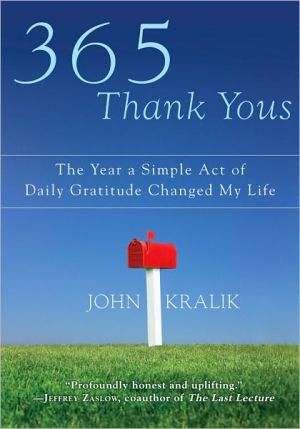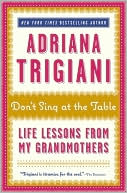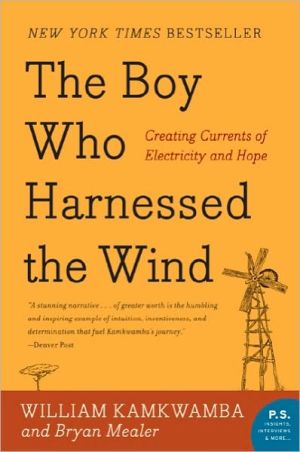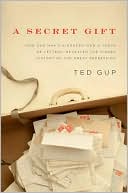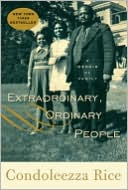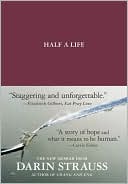365 Thank Yous: The Year a Simple Act of Daily Gratitude Changed My Life
One recent December, at age 53, John Kralik found his life at a terrible, frightening low: his small law firm was failing; he was struggling through a painful second divorce; he had grown distant from his two older children and was afraid he might lose contact with his young daughter; he was living in a tiny apartment where he froze in the winter and baked in the summer; he was 40 pounds overweight; his girlfriend had just broken up with him; and overall, his dearest life...
Search in google:
One recent December, at age 53, John Kralik found his life at a terrible, frightening low: his small law firm was failing; he was struggling through a painful second divorce; he had grown distant from his two older children and was afraid he might lose contact with his young daughter; he was living in a tiny apartment where he froze in the winter and baked in the summer; he was 40 pounds overweight; his girlfriend had just broken up with him; and overall, his dearest life dreams— including hopes of upholding idealistic legal principles and of becoming a judge— seemed to have slipped beyond his reach. Then, during a desperate walk in the hills on New Year’ s Day, John was struck by the belief that his life might become at least tolerable if, instead of focusing on what he didn’ t have, he could find some way to be grateful for what he had. Inspired by a beautiful, simple note his ex-girlfriend had sent to thank him for his Christmas gift, John imagined that he might find a way to feel grateful by writing thank-you notes. To keep himself going, he set himself a goal— come what may— of writing 365 thank-you notes in the coming year.One by one, day after day, he began to handwrite thank yous— for gifts or kindnesses he’ d received from loved ones and coworkers, from past business associates and current foes, from college friends and doctors and store clerks and handymen and neighbors, and anyone, really, absolutely anyone, who’ d done him a good turn, however large or small. Immediately after he’ d sent his very first notes, significant and surprising benefits began to come John’ s way— from financial gain to true friendship, from weight loss to inner peace. While John wrote his notes, the economy collapsed, the bank across the street from his office failed, but thank-you note by thank-you note, John’ s whole life turned around. 365 Thank Yous is a rare memoir: its touching, immediately accessible message— and benefits— come to readers from the plainspoken storytelling of an ordinary man. Kralik sets a believable, doable example of how to live a miraculously good life. To read 365 Thank Yous is to be changed.
A Simple Act of Gratitude\ HOW LEARNING TO SAY THANK YOU CHANGED MY LIFE \ \ By John Kralik \ HYPERION\ Copyright © 2010 John Kralik\ All right reserved.\ ISBN: 978-1-4013-2405-6 \ \ \ Chapter One\ The Lowest Day \ On December 22, 2007, I felt my life was at an irreversible personal nadir. My law firm was losing money and losing its lease. I was going through a difficult divorce, was completely out of funds, and was living in a small, stuffy apartment where I often slept on the floor under an ancient air conditioner. My sons had grown distant from me. A horrible year was ending, with promises that things would soon be even worse.\ I still remember that lowest day. On my way to work that morning, I got a call from my friend Bob, who had gone to law school with me in Michigan thirty years before. Bob asked how I was doing. This was a mistake. Poor Bob. "Not good" is what I said, and my tone was desperate and bitter. I no longer had the ability to pretend that everything was "fine." Bob asked if I wanted to go to breakfast. Another mistake.\ Later, he would tell me he had never seen me this upset.\ That morning, Pasadena was entering its famous, seductive New Year's beauty. With businesses and schools closed for the holidays, the smog clears from the mountains, revealing, just four miles up Lake Avenue from where I stood, the fresh winter brush of the San Gabriel foothills, each ridge a different shade of misty gray in the soft morning light. But I wasn't in those gorgeous foothills. I was meeting Bob at a dingy coffee house near the dust and the vagrants of Pasadena's downtown center. Although the chain restaurant was Bob's choice, I couldn't afford to eat anyplace nicer; I couldn't even afford to eat at this place.\ The man Bob saw across the chipped Formica table was fifty-two years old, forty pounds overweight, pasty, and tired, with a terrified sadness in his eyes. After twenty-eight years of work as a lawyer, I had little more to show than I'd had when I started—and the little I did have was in jeopardy.\ Perhaps because I did not need to be in court that morning and hadn't steeled myself for court, my usual stoicism about my situation had broken down. I was letting my true feelings show.\ As I explained to Bob, I had worked harder than ever at being a good lawyer in 2007. The results were in. I was a failure.\ First, a pair of clients for whom I had recovered more than a million dollars that year had stopped paying my bills. When I brought this to their attention, one of them started writing me e-mails with the subject heading "Your 'Bills.' " Together, they owed me $170,000, which I needed to make my end-of-year payroll and pay Christmas bonuses, and maybe have something left over for myself. Although they could not agree on much else, these clients decided to work together on a plan that could eliminate their attorneys' fees. They jointly ordered the money I had recovered transferred to Texas, where I could not lien it to pay my bills.\ Then there was the case of the sweet woman who had asked me to sue a gentleman she believed was helping her brother hide money from her. After my client gave up the case, it became apparent she'd had a brief affair with the defendant before suing him. Something about the way the affair ended, combined with getting sued, left this defendant unsatisfied with a mere dismissal. So he sued me for having taken on her case against him.\ When I sat down to breakfast with Bob, I had just paid a retainer to the lawyers who would defend me and had begun the process of going through every document, every e-mail, and every pleading in the case to formulate my defense. The suit against me was a plain example of how legal proceedings can become a circle of hatred, in which each vicious legal move is countered by an even more malevolent one, until everyone is out of money. In my darkest moments, I worried that my client's ex-suitor and his relentless desire for revenge would not only leave me completely out of money but would call my practice into question, effectively ending my career as a lawyer.\ Seven years before, I had started my small law practice idealistically. Like some wannabe legal Jerry Maguire, I had set forth my ideals in a mission statement, "The Statement of Ideals," which I shared with my associates and even posted on the wall and on my Web site. For example, I promised to be "true to our beliefs in right and wrong, both as lawyers and as human beings."\ I signed clients up at low rates commemorated in simple, one-page retainer agreements, because I wanted to avoid the page after page of legal mumbo jumbo that most lawyers use to cover their backsides. My rates were low, because I worried about the effect of my bills on my clients. I wanted to "do no harm," which my father, a surgeon, had always preached to me as the foundation of his ethics. Unlike a doctor's, a lawyer's treatment does often, in Hippocrates' words, "injure or wrong" a client. I wanted to help people before my bill became their biggest problem, and I became the principal person harming them.\ But during 2007 I learned, in a painful way, that such idealism had serious limitations as a business model.\ I tried to be logical about what would happen next. It seemed insane to keep trying to do what I had been doing, but I could not see a way out, with all my clients and my employees depending on my willingness to proceed. I had counted on the clients who owed me the $170,000, and I felt too embarrassed to tell my employees now, just three days before Christmas, that there would be no money for year-end bonuses. Bob wondered why I was thinking of bonuses; why, with all my other problems, was it even on my mind?\ Throughout the year, we had been trying to renew the lease on our office space, but then the building went up for sale and for months we had no landlord from whom to seek a new lease. Then, at the beginning of December, a new own er bought the building, and his first decision was to end our tenancy—unless we wanted to accept an above-market rent. When we balked, he asked us to leave as soon as possible. We now needed about $25,000 in cash if we wanted to sign a lease for comparable space in another building.\ When you run a small law practice, much of what comes in also goes out—to rent, employees, insurance, and the other expenses of running the business. What's left at the end is your salary, so to speak. For me, for 2007, this "salary" was going to be nothing. In fact, it was less than nothing: I had lost $12,652. Clients had failed to pay nearly $400,000 in bills. One client paid in toys worth an eighth of his bill. And he was one of the good ones! My last vacation had been in 2003. I had worked sixty hours a week all year, without a break—for less than nothing, it turned out.\ I had accomplished a tour de force of failure.\ Aside from producing no measurable compensation, my work and my role in the world that it represented had become detestable to me. I had wanted to help people as an attorney, but too often I was still just the vehicle whereby clients conveyed hatred, sought retribution, and inflicted pain on their fellow men and women. Some lawyers love the fight and never weary of it. I was not one of those lawyers. To me, the work was too often best done when I got in touch with my inner evil core. And I didn't want to be in better touch with my inner evil core.\ My personal life provided no respite from the seeming financial failure of my practice. Four years before, my perhaps too relentless pursuit of law practice "ideals" had helped cause a separation from my second wife. After the separation, she had remained in our house, and I had moved into one of the nicer new apartments in town. Now that my money was running out, I was living in a small, cheap, poorly ventilated apartment that became an intolerable oven in the summer and cost hundreds of extra dollars in the winter because of inefficient electric heaters. Several nights each week, my seven-year-old daughter lived with me in this plaster box. In the summer, she and I slept on a plastic inflatable mattress in the living room under the loud, aging air conditioner, which provided a small pocket of coolness, as long as we lay on the floor directly underneath it.\ By the beginning of 2007, after more than three years apart, I had thought my second wife and I at least had agreed we could not get back together. Yet by December 22, after more than a year of negotiation, we had no separation agreement, not even regarding custody of our daughter.\ In addition to my daughter, I have two sons from my first marriage. On December 22, 2007, they were twenty-six and twenty-two. During the previous year, my older son had become largely self-sufficient, though there were still occasional cash-flow crises, and the tension from past calamities of this sort had left us distant. "Loans" had often turned into cash infusions. Sometimes clubbing and skiing had seemed to me to take precedence over gainful employment. Meanwhile, my younger son was still finding his way and required financial help not only with tuition and rent, but with his car, car insurance, parking and moving violations, and food.\ In sum? My business was losing money, losing cases, and losing its lease. I was paying mortgages or rent for three households—my second wife's, my younger son's, and my own—when I couldn't afford one. My savings were exhausted. I stood to lose most of what I had earned since my first divorce in a second divorce. I was worried that I might also lose my daughter.\ As the year progressed, there had been days when I was so preoccupied with my problems that I walked into the street without checking for a walk sign. When a car missed me with a honk of the horn, I wondered whether everything might have worked out better had I been hit. I started to envy people who had heart attacks. I did not want to die exactly, but I began to think about the peace I could get in a hospital room, recovering from an accident or a heart attack. The responsibilities of my work would no longer intrude. For just a while, the depressing events might slow. Perhaps I could have a day, just twenty-four hours in a row, when I didn't have to work. When I shared this with Bob, he started to really worry. This was either too scary or so downright pathetic that it embarrassed Bob to hear it. "Come on, John, it's not that bad," he said. He wanted me to return to my usual stoicism. But I couldn't.\ So he asked about Grace.\ I had recently begun a relationship with a young woman in her mid-thirties, whom I will call Grace. Most women of Grace's age saw only my pasty figure. For a while, though, Grace had looked at me in a way that made me remember I had eyes, and that they were blue, not gray like the rest of me. After I met her, I had even bought a pair of contacts, flattered by the notion someone had noticed the color of my eyes and wanted to see them. Being with Grace reawakened parts of me that had become dormant. It had been a long time since I had experienced the joy of spending an evening out with a person who really seemed to love me. Seeing Grace, once a week at least, had seemed to stop the depression for a time. Bob had met Grace and felt I was pretty damn lucky to have another chance at love at my age. He assumed that by mentioning her he might break my mood.\ But Grace had broken up with me the night before. We had been out to dinner and when she asked about my plans for Christmas, I had been vague. I had thought I needed to be vague. I was still trying to make plans with my wife that would allow my daughter to be with me for some portion of that day. After I knew those plans, I needed to make arrangements to see my sons. After I had these arrangements in place, I tried to explain, Grace and I could make plans. Grace concluded that this made her too low in my order of priorities. "I can't do this," she said, and asked to go home.\ When I dropped her off, she insisted on walking up the driveway alone. I called up the darkened path, telling her I would be waiting if she changed her mind. I asked if, even if she didn't ever want to go out with me again, would she at least get together with me to exchange Christmas gifts? "I don't want a Christmas present from you," she called back. And with that, the only door in my life that seemed to offer hope closed.\ What could I offer her, anyway? I was broke, I worked almost all the time, and I spent the remaining time trying to maintain contact with and take care of my children. There was no getting around the fact I was not available to Grace in the way she deserved. As she put it, "I want someone like you, just someone who's available."\ It had not been a good year.\ Bob reminded me that he had my cell phone number and he was going to use it—to check up on me. Neither of us knew then what would happen next, or that a year later, everything would have changed.\ (Continues...)\ \ \ \ \ Excerpted from A Simple Act of Gratitude by John Kralik Copyright © 2010 by John Kralik. Excerpted by permission of HYPERION. All rights reserved. No part of this excerpt may be reproduced or reprinted without permission in writing from the publisher.\ Excerpts are provided by Dial-A-Book Inc. solely for the personal use of visitors to this web site. \ \
Contents\ 1. The Lowest Day....................1\ 2. A Walk in the Mountains....................11\ 3. New Year's Mail....................18\ 4. My First Thank-You Note....................22\ 5. How Are You?....................35\ 6. Reading Pollyanna in Sierra Madre; or, Life as a Series of Fortunate Events....................48\ 7. An End of Winter....................64\ 8. Thank You for Paying Your Bills....................66\ 9. Thank the Starbucks Guy....................77\ 10. Mediation....................92\ 11. Birthday Cards....................96\ 12. Doctor Hudson's Secret Journal....................108\ 13. Extreme Thank Yous....................125\ 14. The Unopened File....................134\ 15. Father's Day....................138\ 16. A "Business" Trip to Beijing....................140\ 17. Economic Meltdown on Lake Avenue....................144\ 18. Heartbreak....................151\ 19. The Stock Market Crashes ... into Thanksgiving....................162\ 20. Running with Friends....................169\ 21. In Training....................179\ 22. December, the Movie and the Reality; or, It's a Wonderful Life....................185\ 23. A Better Man....................190\ 24. A House, a Dream Job, Grace, and a Sandwich Wrapped in Waxed Paper; or, What I Wanted....................201\ 25. A Tie....................211\ Afterword: The 730th Note....................213\ Appendix I: How to Write Thank-You Notes....................221\ Appendix II: A Statement of Ideals....................227\ Acknowledgments....................231
